
SAVE THE DATE
The tenth edition of the
"DigiTraining Plus:
New Technologies for the European Cinemas of the Future
course will take place
in Cracow and Warsaw
from 28 August to 1 September 2013
Deadline for registration: 30 May 2013
Further information is published on our website,
at the page dedicated to the course:
http://www.mediasalles.it/training/training.htm
Application form
Focus on the speakers
Michael Karagosian,
MKPE Founder and President

(click the photo to read the biography)
|
Marta Materska-Samek, President of Fundacja
Rozwoju Kina
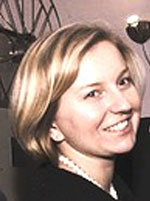
(click the photo to read the biography)
|
Anna Sienkiewicz-Rogowska,
Head of the Department of Education and Dissemination of Film Culture, The Polish Film
Institute
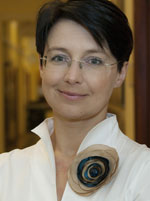
(click the photo to read the biography)
|
Peter Bosma,
independent programmer, researcher, teacher

(click the photo to read the biography)
|
|
Getting ready for DigiTraining Plus 2013: Polish cinema in figures
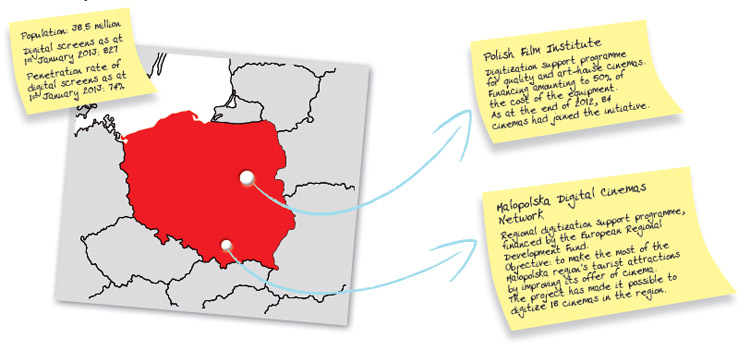
With over 38 million tickets sold and a total of almost 1,200 screens, Poland is one of the leading markets in Central-Eastern Europe.
As to the new technologies, with 592 digital screens, at the start of 2012 Poland proved to have converted around half her screens.
The figures available for 2013 have shown a further increase (+39.7%) in the number of digital screens, which, at 1 January 2013, came to 827 and now represent three quarters of Poland's total screens.
Since the installation of the first digital projector in Warsaw in 2007, the transition to the new technologies has proceeded rapidly and Poland is now approaching 100% digitalization.
Poland: a variety of economic models for different types of cinemas
This process has been made possible thanks to different economic models.
On the one hand, the country's three leading exhibitors - Multikino, Helios and Cinema City - have now completed the conversion of their screens. Multikino had already digitalised its 208 theatres in 2011, and at 30 June 2012 it counted 223 screens, all of which digital.
Helios, 149 screens, and Cinemacity, 339 screens, instead, completed their 100% digital transition over the first six months of 2012.
If the big chains are able to digitalize using their own resources, several public support schemes have been made available at a national and local level for smaller and commercially weaker cinemas.
In June 2011 the Polish Film Institute launched a programme of support for digitalization specifically addressing quality and arthouse cinemas, with the objective of creating exhibition spaces with a cultural role, which were at the same time in the avantgarde in terms of screening technologies.
To obtain this financing cinemas must first join the Arthouse Cinemas Network, demonstrating that their programming focuses mainly on European and domestic productions (25% of screenings must be Polish films and at least 10 titles must be first-time releases in the year in question).
Moreover, the cinema must prove that at least 300 films are screened per year and that it carries out work on visual education.
If the application is accepted, the cinema receives financing to cover 50% of the cost of digital equipment (amounting to around 40,000 euros according to estimates of the costs for projectors) and becomes part of the Polish Digital Cinema Network: website www.c-kino.pl .
At the end of 2012, 84 cinemas had joined the initiative.
As well as this national financing scheme, in Poland there are also regional initiatives in support of digitalization.
Amongst the latter, the project "Malopolska Digital Cinemas Network" deserves mention. The project was launched in 2010 as an initiative of the Fundacja Rozwoju Kina, an organization supporting the cinema sector with its headquarters in Krakow.
The special characteristic of this initiative is that the movie theatre is considered a key element in the tourist attractions of a given area. Starting out from this assumption, the project, supported by the European Regional Development Fund (ERDF) aims to enhance the attraction of the regions of Lesser Poland to tourists - in particular smaller places - by improving the offer of cinema.
The financing covers 75% of the net costs of conversion: the purchase of the projector and server, adaptation of the sound system and the work needed to adapt the screening room, as well as the installation of 3D technology. Thanks to this scheme it has been possible to digitalize 18 cinemas in the region of Lesser Poland.

(Click here to see tables and graphs)
(Per leggere il testo in italiano cliccare qui) |
|
WOMEN IN DIGITAL CINEMA
Ann Overbergh
BAM-Art
 If greed is a capital sin, surely that doesn't count when the object of it can be shared amongst many. I myself am guilty of not choosing between cultural passions. My first love was music, and I started my career working for an experimental music festival. After moving on to theatre, music theatre and opera and volunteering for music clubs and art cinema for a while, for the last four years I have been working for BAM Art. BAM Art is the Flemish support organization for visual and audiovisual arts and cinema. We help professional players (exhibitors, distributors, educational workers,...) by spreading info and knowledge: newsletters, conferences, workshops, personal advice, etc. If greed is a capital sin, surely that doesn't count when the object of it can be shared amongst many. I myself am guilty of not choosing between cultural passions. My first love was music, and I started my career working for an experimental music festival. After moving on to theatre, music theatre and opera and volunteering for music clubs and art cinema for a while, for the last four years I have been working for BAM Art. BAM Art is the Flemish support organization for visual and audiovisual arts and cinema. We help professional players (exhibitors, distributors, educational workers,...) by spreading info and knowledge: newsletters, conferences, workshops, personal advice, etc.
BAM Art has been actively involved with shaping the financially complex transfer to d-cinema equipment for the smaller and more vulnerable exhibitors in Flanders. We hired expert Sophie De Vinck to assist and coach us in negotiating the best deals while preserving cultural diversity on Flemish screens. Notwithstanding exciting opportunities - high quality image and sound, the possibility of more diversity and flexibility - there were also considerable risks involved, the most important being that of jeopardizing our exhibitors' freedom of choice in programming. We are proud that, with the help of the Flemish Culture Ministry, we have managed to help nearly all of our cultural exhibitors to make the move to digital projection.
But digital cinema is more than 2K-technology alone. It involves the convergence of different media and delivery circuits for digital storytelling. It paves the way for exciting trans-media projects: stories inhabiting the big screen or television, online, in game versions, interactively engaging with audiences on social media, and creating new formats for different screens. It involves event-based cinema, concerts, debate, and theatre pieces, interactive after-show discussions with artists, the streaming of online content etc. It also involves new modes of production and distribution.
Convinced that Europe must not shy away from other parts of the world for inspiration, two years ago I started following related developments evolving in Africa. I am now working on a PhD focusing on new media, new technology, and how they affect the production and distribution of audiovisual creative content in East-Africa. The greater focus on mobile content in particular could be an inspiration for European creative artists. Short comedy series for the small screen, animation, interactive platforms for sharing music and poetry, self-made shows shared through mobile phones... Because after all, without creative story-telling, technology is just a shell. It is great to see an ever-growing pool of creative talent making use of innovative technology to produce a myriad of new and exciting stories for us to enjoy.
(Per leggere il testo in italiano cliccare qui)
|
|
All different, all digital
by Elisabetta Galeffi
This column hosts portraits of cinemas in Europe and the rest of the world which are quite different from one another but have in common the fact that they have all adopted digital projection.
| Country |
Site |
Town |
Company |
Number of digital
projectors |
Projector |
Resolution |
Server |
No. of
3D screens |
Denmark |
Grand Teatret
|
Copenhagen
|
Grand
|
6 |
Barco
|
2K |
Dolby |
- |
Grand Teatret, Copenhagen
It is 4 January, 7.30 p.m.: the first screening of the evening at Copenhagen's Cinema Grand. Winter, and it's been as black as night for at least three hours. The most popular means of transport for getting to the 'Grand Teatret' is the bicycle.
 The difference in the evening is that in the dark cyclists wear a helmet fitted with a light. Like miners, for example. At seven thirty, the bike stands in front of the Grand are "overbooked and a quiet, orderly queue, helmets in hand, is waiting to buy tickets for one of the 6 auditoriums in the historical theatre. Founded in 1913, the Grand is on" e of the oldest cinemas in the Danish capital: impossible to remain indifferent to the fascination of this Art Nouveau style building right in the city centre. Mikkel Bryggers Gade 8, a stone's throw away from Tivoli, the popular amusement park, and the Town Hall. A few hours at the Grand or stopping off at the theatre's café for a magic moment surrounded by the beautiful posters of former days that cover the walls is much more than just a way of warming up and recovering from Denmark's icy winter winds. The difference in the evening is that in the dark cyclists wear a helmet fitted with a light. Like miners, for example. At seven thirty, the bike stands in front of the Grand are "overbooked and a quiet, orderly queue, helmets in hand, is waiting to buy tickets for one of the 6 auditoriums in the historical theatre. Founded in 1913, the Grand is on" e of the oldest cinemas in the Danish capital: impossible to remain indifferent to the fascination of this Art Nouveau style building right in the city centre. Mikkel Bryggers Gade 8, a stone's throw away from Tivoli, the popular amusement park, and the Town Hall. A few hours at the Grand or stopping off at the theatre's café for a magic moment surrounded by the beautiful posters of former days that cover the walls is much more than just a way of warming up and recovering from Denmark's icy winter winds.
Thank goodness in Denmark films are screened in their original language with subtitles: it wasn't difficult to find one that we could follow in German. There would have been fewer problems with English but "Barbara", an art-house film, whilst having won an award at the 2012 Berlinale, would have been more difficult to find anywhere else and seemed even more tempting than "Jack Reacher" with Tom Cruise.
Another virtue of the Grand Teatret is that its 6 auditoriums screen up to nine films of all types. The secret is to juggle the screening times: the first is at 11.30 a.m. and the last at 9.30 p.m.
Grand Teatret is thus marked by close attention to programming which, moreover, despite a century of history, is perfectly "modern", having become 100% digital in 2012.
In the smaller auditoriums it feels like watching a film in the company of old friends. And in this cinema there is the same sort of behaviour you would expect in your own home or at friends'. No empty mega-boxes of popcorn or cans on the floor at the end of the screening. The red velvet armchairs stay as clean as the dark-coloured floors in the auditorium. The secret is not only good manners which, we admit, such a delicately sophisticated place seems to oblige us to respect, but the menu of the Grand's café: aniseed or marzipan biscuits, delicious mini-tartines with salmon or caviar, brownies for the lads and ladies who breakfast at 11.30 a.m. whilst enjoying a film.
To stress the link between the seventh art and the figurative arts, exhibitions of photographs and paintings are organized at the Grand, introduced under the formula "Vernissage Minuit" (also advertised on Facebook for those who understand Danish). Will Lars von Trier be there, too?
And so the Grand is still alive when the sun sets late at night over Copenhagen's canals and the busy flow of cyclists.
(Per leggere il testo in italiano cliccare qui)
|
|
Digital at Ciné - Giornate Estive di Cinema (Summer Cinema Days)
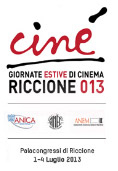
A whole day devoted to digital. This is one of the main novelties of the 2013 Ciné - Giornate Estive di Cinema (Summer Cinema Days), the traditional summer meeting for professional players in the cinema industry, scheduled in Riccione from 1 to 4 July 2013. The opening of the event, on which MEDIA Salles has collaborated, will be devoted to meetings, seminars and presentations centring on digital cinema, on the issues at stake and the opportunities for exhibitors.
The presentation at the press conference will be in Cannes on Sunday 19 May at 12.00 p.m. in the Italian Pavilion.
(Per leggere il testo in italiano cliccare qui) |

We Want Cinema is the new online platform, set up by the Dutch distributor Amstelfilm, where the audience decide what is shown in the movie theatre.
Spectators can choose what they want to see among old and new films, documentaries, compiled programs and many other types of alternative content. And they choose when they want to see it as well.
Anyone can create an event, book the first tickets and invite friends through the social media. It is also possible to join a group of people with the same interests or to join a planned event. When enough people buy a ticket, the event will take place.
We Want Cinema is now partnering up with Germany and planning to expand on a worldwide scale.
A presentation will be held at the Cannes Film Festival on Tuesday 21 May, at 4 p.m., at the Dutch Pavilion, followed by cocktails.
For more information and registration to the Cannes event, please write to janna@amstelfilm.nl
(Per leggere il testo in italiano cliccare qui) |
|
News on digitalization worldwide
by Francesca Mesiano
Park Circus Films opens in France
Park Circus, a Glasgow-based distribution company specializing in classics and cult movies - over 1,000 titles available in digital format - announced last February their start-up in France, a key market for the distribution of this type of movie. Park Circus Film SARL's activities will be backed up by their Scottish headquarters and headed by Van Papadopoulos, well-known for having directed the Cannes Classics section at the Cannes Festival in the past and for his experience in the field of distribution. In honour of this new opening, the company has announced the digital remasterization of A. Hitchcocks's only 3D film , "Dial M for Murder", to be released in October 2013, and "The Last Picture Show" by P. Bogdanovich, on French cinema programmes in November 2013.
(Per leggere il testo in italiano cliccare qui)
Exhibition in cinemas thanks to BY Experience and DSAT
The documentary filmmaker Phil Grabsky Leonardo Live, In Search of Beethoven, The Boy Mir - Ten Years in Afghanistan) and BY Experience, one of the leading distribution companies for alternative content, active in 60 countries for a total of around 2,000 screens, have launched Exhibition, a series of art events to be distributed in cinemas in around 30 countries all over the world. The official partner for satellite distribution will be DSAT, the joint venture of Eutelsat and dcinex. Exhibition's initial event, Manet: Portraying Life, organized by London's Royal Academy of Arts in collaboration with the Toledo Museum of Art in Ohio, was broadcast on 11 April last in theatres in 30 countries (for further information: http://www.exhibitiononscreen.com/).
The next two events after Manet, will be Munch - from the National Museum and Munch Museum in Oslo (27 June) and Vermeer, from the National Gallery in London (10 October).
(Per leggere il testo in italiano cliccare qui)
Eurimages supports the digitalization of movie theatres
In collaboration with the integrator dcinex, Eurimages has implemented a support scheme for the digitalization of cinemas belonging to the circuit.
The financing amounts to 30,000 euros per screen and/or 50% of the costs indicated in the invoice issued by the integrator for the purchase of equipment, which must necessarily conform to DCI specifications.
Each applicant can answer the call for applications to digitalize a maximum of one screen per cinema for each deadline. The call has four deadlines a year. The next 2013 deadlines will be 26 August and 25 October.
(Per leggere il testo in italiano cliccare qui)
|
Italy
Support from the Regions for Digitalisation*
Le Marche
Since 2009 the Region of Le Marche has taken steps to support cinemas facing conversion to the new technologies.
The new call for applications launched at the beginning of the year closed on 8 April 2013. The overall financing for this new support comes to a little under one million euros, in the context of the European Regional Development Fund (ERDF 2007-2013).
The contributions - amounting to a maximum of 50% of eligible costs - is destined for the purchase of equipment for digital projection but also for satellite reception systems, advertising material and the costs of re-equipping the projection room.
Abruzzo
The 2013 Financial law, approved last December by the Abruzzo Region, includes an amendment - presented by Councillor Menna - on facilitations for small companies managing movie theatres, in order to improve their market position.
In particular, there will be support for the cost of purchasing digital projection equipment, as well as equipment for satellite reception and for re-equipping projection rooms, plant and ancillary rooms.
The initial overall financing budgeted is of 100 000 euros.
Basilicata
With a view to initiating possible measures for supporting Basilicata's movie theatres, at the beginning of April a meeting was held between Vito De Filippo, President of the Basilicata Region, Alberto Versace, President of the Coordinating Committee of "Sensi Contemporanei" and Head of the Development Policies Department at the Ministry for Economic Development, Paride Leporace, Director of the Lucania Film Commission, the representatives of AGIS and ANEC (the Italian Cinema Exhibitors' Association) and the owners and managers of cinemas in Basilicata. During the discussion emphasis was placed on the crucial importance of the conversion to digital technology for the 25 screens active in the region and the need for support measures for exhibitors. In particular the President of the Region De Filippo expressed the Region's intention to intervene in the "Sensi Contemporanei" project promoted by the Ministry of Economic Development.
* This article updates the articles published in DGT online informer nos. 89, 88, 82.
(Per leggere il testo in italiano cliccare qui)
Giometti Cinema signs an agreement on digital with Sony
In March 2013 Giometti Cinema and Sony reached a VPF agreement on the digitization of the chain's screens. In 2012 Giometti Cinema had already fully digitalized the Tolentino multiplex with Sony 4K projectors. Thanks to this new contract another 18 digital projectors will be installed.
(Per leggere il testo in italiano cliccare qui) |
|
|
United Kingdom
The country's northernmost digital cinema is in Thurso
The Thurso independent cinema (Thurso, Caithness, Highlands) is the northernmost digital cinema complex in Great Britain.
Thanks to a VPF agreement with Sony Digital Cinema, in February 2013 its two auditoriums were fitted with cutting-edge digital and 3D technology, with two SRX-R515 4K projectors.
The cinema, which re-opened in July 2012 thanks to a public campaign, is also equipped for the screening of alternative content, such as performances by the Royal Opera House or the cultural events of the British Museum Live.
The Thurso thus assumes the significance of an important cultural centre in this region.
Rob Arthur, Manager of the Thurso, is well satisfied with the decision to convert to digital screening, which represents a great opportunity for improving the cinema's offer: "Now we can offer a wider range of content, attracting wider audiences".
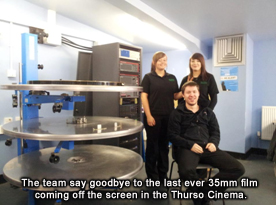
(Per leggere il testo in italiano cliccare qui) |
|
Scandinavia
SF Bio-Finnkino merger
In March 2013 the Swedish company Ratos, owner of Finland's leading exhibition company, Finnkino, purchased a majority share packet in SF Bio, the largest chain of cinemas in Sweden, which in turn comprises SF Kino, active in Norway. The Bonnier publishing group will remain a minority, 40% shareholder.
The group's new CEO will be Jan Bernhardsson.
The merger between these players - who will nonetheless maintain the separate names of Finnkino and SF Bio - gives rise to the biggest exhibition company in the north, with 67 cinemas and 440 screens in Sweden, Norway, Finland, Estonia and Latvia.
(Per leggere il testo in italiano cliccare qui) |
|
Norway
Nordic Digital Alliance becomes Arts Alliance Media
Nordic Digital Alliance (NDA) was originally a joint venture formed by Arts Alliance Media and a consortium of local companies to help roll out digitalization in Norway.
Taken over by AAM in 2011, it has rebranded to Arts Alliance Media since the beginning of February 2013. The company, which will maintain a working office in Norway, has also announced a partnership with Videovox, one of the traditional suppliers of technology in Scandinavia, which has been providing equipment to Scandinavian cinemas since 1978 and which - at the time of the digital transition - became the main integrator in Sweden and Norway.
Videovox will be the official supplier of AAM software in Norway and non-exclusive reseller in Sweden, strengthening AAM's position on the Scandinavian market.
(Per leggere il testo in italiano cliccare qui) |
|
Latin America
Cine Colombia signs agreement with Arts Alliance Media and Cinevise
Agreements go ahead for the installation of the AAM's Theatre Management System, known as Screenwriter, in Latin America. See DGT Online Informer no. 88).
In January 2013 Cine Colombia signed an agreement with the integrator AAM and the digital technology provider Cinevise for the installation of Screenwriter in cinemas managed by the chain throughout the country.
With 248 screens in 37 cinemas located in 10 different cities, Cine Colombia is the leading cinema exhibitor in the country and was also one of the chains to pioneer digitalization in Latin America, installing the first digital projector in 2007.
By June 2013, Cine Colombia will be one of the first Latin American circuits to have achieved the objective of 100% digitalization.
(Per leggere il testo in italiano cliccare qui) |
|
|

![]()
![]()
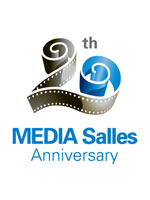

 I should like to start with an invitation. An invitation to take part in the event that MEDIA Salles is organizing during the Cannes Film Festival, thanks to the collaboration of the Polish Film Institute which, together with the Fundacja Rozwoju Kina, is our partner for the 2013 edition of our training course on digital cinema.
I should like to start with an invitation. An invitation to take part in the event that MEDIA Salles is organizing during the Cannes Film Festival, thanks to the collaboration of the Polish Film Institute which, together with the Fundacja Rozwoju Kina, is our partner for the 2013 edition of our training course on digital cinema.






 If greed is a capital sin, surely that doesn't count when the object of it can be shared amongst many. I myself am guilty of not choosing between cultural passions. My first love was music, and I started my career working for an experimental music festival. After moving on to theatre, music theatre and opera and volunteering for music clubs and art cinema for a while, for the last four years I have been working for BAM Art. BAM Art is the Flemish support organization for visual and audiovisual arts and cinema. We help professional players (exhibitors, distributors, educational workers,...) by spreading info and knowledge: newsletters, conferences, workshops, personal advice, etc.
If greed is a capital sin, surely that doesn't count when the object of it can be shared amongst many. I myself am guilty of not choosing between cultural passions. My first love was music, and I started my career working for an experimental music festival. After moving on to theatre, music theatre and opera and volunteering for music clubs and art cinema for a while, for the last four years I have been working for BAM Art. BAM Art is the Flemish support organization for visual and audiovisual arts and cinema. We help professional players (exhibitors, distributors, educational workers,...) by spreading info and knowledge: newsletters, conferences, workshops, personal advice, etc.  The difference in the evening is that in the dark cyclists wear a helmet fitted with a light. Like miners, for example. At seven thirty, the bike stands in front of the Grand are "overbooked and a quiet, orderly queue, helmets in hand, is waiting to buy tickets for one of the 6 auditoriums in the historical theatre. Founded in 1913, the Grand is on" e of the oldest cinemas in the Danish capital: impossible to remain indifferent to the fascination of this Art Nouveau style building right in the city centre. Mikkel Bryggers Gade 8, a stone's throw away from Tivoli, the popular amusement park, and the Town Hall. A few hours at the Grand or stopping off at the theatre's café for a magic moment surrounded by the beautiful posters of former days that cover the walls is much more than just a way of warming up and recovering from Denmark's icy winter winds.
The difference in the evening is that in the dark cyclists wear a helmet fitted with a light. Like miners, for example. At seven thirty, the bike stands in front of the Grand are "overbooked and a quiet, orderly queue, helmets in hand, is waiting to buy tickets for one of the 6 auditoriums in the historical theatre. Founded in 1913, the Grand is on" e of the oldest cinemas in the Danish capital: impossible to remain indifferent to the fascination of this Art Nouveau style building right in the city centre. Mikkel Bryggers Gade 8, a stone's throw away from Tivoli, the popular amusement park, and the Town Hall. A few hours at the Grand or stopping off at the theatre's café for a magic moment surrounded by the beautiful posters of former days that cover the walls is much more than just a way of warming up and recovering from Denmark's icy winter winds.
